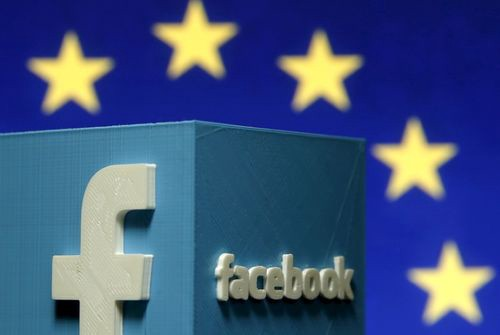In South Korea, authorities send text messages indicating the latest movements of people affected by the coronavirus. The result: paranoid citizens flirt with each other and publicly denounce themselves.
theguardian.com/world/2020/mar…
theguardian.com/world/2020/mar…

It doesn't "lag" : a Chinese company, which works with the police, assures that its facial recognition software is capable of recognizing someone even if he wears a mask. Soon to export ?
reuters.com/article/us-hea…
reuters.com/article/us-hea…

Unexpected consequence of the coronavirus: it reveals the existence of clandestine surveillance programs.
nytimes.com/2020/03/16/wor…
nytimes.com/2020/03/16/wor…
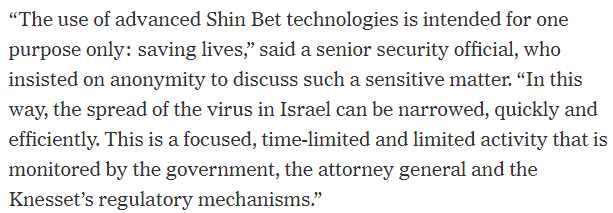
From each to each nation start-up, France opted for an analog control of containment when Korea deployed an app. In addition to the rate of equipment in smartphones, there is another thing: we do not practice massive tests.
technologyreview.com/s/615329/coron…
technologyreview.com/s/615329/coron…

It is the turn of the United States to think about using geolocation data to control #COVID19. 's evolution. Facebook and Google were notably approached !
washingtonpost.com/technology/202…
washingtonpost.com/technology/202…

At the same time, a Texan company says that it is on the point of deploying on American soil thermal cameras capable of detecting who has a fever. It is reminiscent of the helmets used by the police in China.
vice.com/en_us/article/…
vice.com/en_us/article/…

Italy is tightening police containment controls: anyone lying about the fact that they are not under quarantine risks up to 12 years in prison.
corriere.it/cronache/20_ma…
corriere.it/cronache/20_ma…

NSO, the sulphurous Israeli surveillance champion, is working on a new tool that tracks the movements of a person infected with COVID-19. A dozen countries are currently testing it.
bloomberg.com/news/articles/…
bloomberg.com/news/articles/…

The coronavirus is an opportunity for the usual suspects of surveillance:
- Palantir helps the federal 🇺🇸 public health agency to analyze data
- Clearview, the scarecrow of facial recognition, wants to identify infected patients
wsj.com/articles/to-tr…
- Palantir helps the federal 🇺🇸 public health agency to analyze data
- Clearview, the scarecrow of facial recognition, wants to identify infected patients
wsj.com/articles/to-tr…

In Italy, telephone operators, represented by the Telecoms Association, make themselves available to the authorities to collect geolocation data from the population, and thus retrace the route of infected people.
asstel.it/comunicato-sta…
asstel.it/comunicato-sta…

#COVID19 : Mark Zuckerberg denies any sharing of geolocation data with the authorities by invoking: cough: user consent.
cnet.com/news/zuckerber…
cnet.com/news/zuckerber…

To complete this thread, let's add a little Chinese management of the epidemic.
Interesting point of view from a researcher at the University of HK 🇭🇰: The surveillance model 🇨🇳 didn't contain the epidemic, but favored it !
somatosphere.net/forumpost/coro…
Interesting point of view from a researcher at the University of HK 🇭🇰: The surveillance model 🇨🇳 didn't contain the epidemic, but favored it !
somatosphere.net/forumpost/coro…

Spain is launching coronamadrid.com , an application to geolocate people infected with COVID-19 in the capital.
lavanguardia.com/tecnologia/202…

lavanguardia.com/tecnologia/202…


In Nice and in Paris, drones are deployed by the police to monitor compliance with confinement.
https://twitter.com/afpfr/status/1241318385008418818
"Stay at home, you cannot stay in this area" the police control the #Louvre by drone in Paris. #coronavirus
#COVID19
#COVID19
Huge, the Quarantine in Taiwan ! 🇼🇸
https://twitter.com/MiloHsieh/status/1241540231595044864
A more fragile existence in which "your state of health can suddenly be shared with millions of people".
nytimes.com/2020/03/23/tec…
nytimes.com/2020/03/23/tec…

In Poland, authorities impose an app on quarantined individuals: once downloaded, it forces them to take selfies regularly; after 20 minutes, the police show up.
cbsnews.com/news/coronavir…
cbsnews.com/news/coronavir…

The @EU_Commission is asking telecom operators to share the anonymized data of their customers to fight the coronavirus. "We will choose one per country," says @ThierryBreton.
politico.eu/article/europe…

politico.eu/article/europe…


Since we risk talking about it again in the coming weeks during the unavoidable debate on patient surveillance:
--- Anonymized --- data --- do --- not --- exist ---
themarkup.org/ask-the-markup…
--- Anonymized --- data --- do --- not --- exist ---
themarkup.org/ask-the-markup…

According to this study by Imperial College London, you have to be prepared to undergo social distancing measures for at least 18 months (while a vaccine is available, and in the hope that it works).
imperial.ac.uk/media/imperial…
imperial.ac.uk/media/imperial…

When we see the tensions linked to pre-containment transhumance, we can easily imagine the consequences of a more intrusive model: public stigma and denunciation, as in Korea.
theguardian.com/world/2020/mar…

theguardian.com/world/2020/mar…


A figure to keep in mind when discussing a possible COVID-19 monitoring by time: the penetration rate of the smartphone. At the top, we find 2 countries which practice contact tracing: South Korea 🇰🇷 (95%) and Israel 🇮🇱 (88%). 75% in France 🇫🇷.
statista.com/statistics/539…
statista.com/statistics/539…

During 3 days, 620,000 people in Singapore downloaded TraceTogether, the government's open source application. Thanks to Bluetooth, it can identify anyone who has been within 2m of an infected person for at least 30 minutes.
straitstimes.com/singapore/coro…

straitstimes.com/singapore/coro…
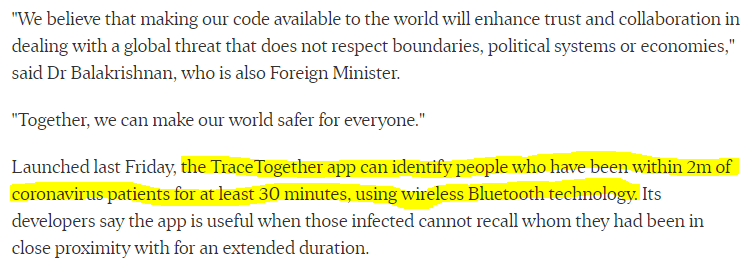

To organize its data and allocate its resources in the fight against the coronavirus, the British public health system has found help from a well-known company in the small intelligence world. (Guess).
news.sky.com/story/coronavi…
news.sky.com/story/coronavi…

In the United Kingdom or in Israel, 2 million people have already downloaded apps to share their health data and their geolocation with the authorities.
This is one of the lessons from this pandemic: consent is readily given.
forbes.com/sites/thomasbr…


This is one of the lessons from this pandemic: consent is readily given.
forbes.com/sites/thomasbr…



The United States analyzes geolocation data to measure mobility or compliance with confinement by relying on the opaque mobile marketing industry, known for reselling the information it collects.
msn.com/en-us/news/us/…
msn.com/en-us/news/us/…

While Moscow has just gone into complete confinement, the town hall is working on an "intelligent control system": each resident will have to register online and will receive an individual QR code to present to the police.
meduza.io/amp/en/feature…
meduza.io/amp/en/feature…

According to the Israeli Defense Minister, geolocating infected people is no longer enough; each inhabitant could be assigned a score (from 1 to 10) to measure contagiousness. NSO, the sulfur merchant of surveillance, works there.
haaretz.com/amp/israel-new…
haaretz.com/amp/israel-new…

In the UK, police fly their drones over fields and scold anyone on Twitter for non-essential activities during confinement.
https://twitter.com/DerbysPolice/status/1243168931503882241
@DerbysPolice @DerPolDroneUnit A team of Oxford researchers - whom I mentioned earlier in this thread - is working on an application project to track people exposed to the post-containment virus.
Their recommendations: not compulsory, works thanks to Bluetooth and a color code.
Their recommendations: not compulsory, works thanks to Bluetooth and a color code.

@DerbysPolice @DerPolDroneUnit They publish new conclusions along these lines in the journal Science. In summary: the virus is progressing too quickly to stick to analog monitoring; an application could prove to be very useful to conclude that it is massively used.
science.sciencemag.org/content/early/…
science.sciencemag.org/content/early/…

@DerbysPolice @DerPolDroneUnit In 🇩🇪, as in 🇬🇧, researchers are advancing on a backtracking application. After installation, it generates a random ID, and the data is stored locally on the phone. No geolocation: what matters is proximity.
sueddeutsche.de/digital/corona…
sueddeutsche.de/digital/corona…

The functioning of such an application is explained quite precisely in this article by @ netzpolitik The central idea: to prevent that one can identify a phone, and therefore a person.
netzpolitik.org/2020/corona-tr…
netzpolitik.org/2020/corona-tr…

After having signed a partnership with the British healthcare system to fight COVID-19, Palantir is in talks with France and Germany. The company says it can be useful in getting out of containment.
bloomberg.com/amp/news/artic…
bloomberg.com/amp/news/artic…

A Swiss researcher working on a Singapore-style tracking app comments on the announcement of a city-state lockdown. Contact tracing can only be part of the strategy and the app is still underused.
https://twitter.com/marcelsalathe/status/1246150383568850946
We also learn that in Italy, a company, @cy4gate_cyber, offers (free) the authorities to combine GPS, Bluetooth and relay antenna data to track patients. System name: Human Interaction Tracking System. HITS. 
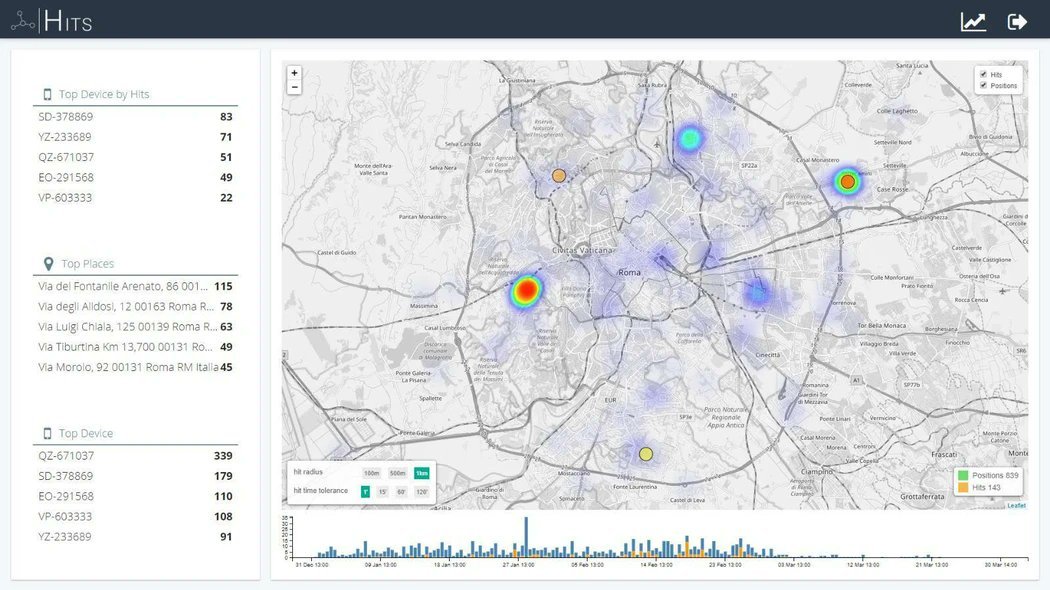
An Australian State has just voted a text requiring the wearing of an electronic bracelet for people placed in quarantine. A surveillance camera can also be installed in their home. They risk prison if they refuse.
theregister.co.uk/AMP/2020/04/01…
theregister.co.uk/AMP/2020/04/01…
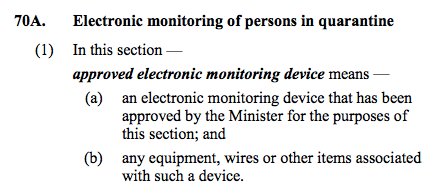
Despite the tracing, the Singaporean Prime Minister explains that it is impossible to know how people got sick in half of the new cases.
We're talking about an area of 720 km2. An application will not save us from the virus.
straitstimes.com/singapore/heal…
We're talking about an area of 720 km2. An application will not save us from the virus.
straitstimes.com/singapore/heal…

An american start-up wants to deploy connected objects to allow companies to follow their patients themselves. She wants to produce 10,000. It reminds me of these Bluetooth cookies used to measure productivity.
techcrunch.com/2020/04/02/est…
techcrunch.com/2020/04/02/est…

On the side of the surveillance dithyrambists, we are already rubbing our hands: "It seems reasonable to predict that robotization will progress strongly due to the coronavirus" .
https://twitter.com/obsarm/status/1246105015128899590
South African researchers are working on an app that would not only track infected people, but also reward promotions in stores for those who respect containment. All with blockchain. ☠️
news.uct.ac.za/article/-2020-…
news.uct.ac.za/article/-2020-…

Paternalism & pandemic in France: @leJDD explains to us that we are unruly calves based on data collected on apps (which?) By a start-up - Covimoov - which intends to win the post-confinement setting. 

Result: the newspapers already make their headlines on "the French who relax". The boss of Covimoov himself admits, however, that the increase in travel is partly linked to the resumption of economic activity.
Covimoov seems less intrusive because the application does not track anyone. But since Edouard Philippe spoke of a progressive deconfinement, what is the lesson of this card? Whether the Manche, Cantal or the Ardennes (in red) must come out later?
Oops. the start-up’s name is Geo4cast, Covid Moov is the name of the tool.
In 2017, Geo4cast was part of the French Tech Chinese tour. His specialty: geolocated data collection and processing tools, movement and behavior analysis.
lepetitjournal.com/hong-kong/actu…
lepetitjournal.com/hong-kong/actu…

GEO4CAST also markets GEO4TRACK, a tool that allows "to monetize geolocation data". This is what turns an application you download into a privacy vacuum cleaner. All that remains is to find their customers ?
geo4cast.ai/geo4track/
geo4cast.ai/geo4track/

In Singapore, 1 in 6 residents downloaded TraceTogether, the app to track infected people. Largely insufficient according to the government (which targets 75% of the population). At this rate, it will not remain optional for very long.
https://twitter.com/marcelsalathe/status/1246352109936803840
The deconfinement plan (of "coexistence with the virus") announced by the Italian authorities provides, in addition to the compulsory wearing of the mask, an application for tracking contaminated people on the South Korean model.
free-press.it/2020/04/05/com…
free-press.it/2020/04/05/com…

Pending the AP-HP, Palantir continues its public health takeover in a pandemic time: the company has just signed a contract with the American coast guard, which has been participating in the evacuation of cruise ships for several weeks.
forbes.com/sites/thomasbr…

forbes.com/sites/thomasbr…


We are told that a tracking app would be based on volunteering. Is. But once we receive a notification?
To enforce quarantine, South Korea, often set up as a model, is considering imposing the wearing of an electronic bracelet.
Poke @YonhapNews
m-en.yna.co.kr/view/AEN202004…

To enforce quarantine, South Korea, often set up as a model, is considering imposing the wearing of an electronic bracelet.
Poke @YonhapNews
m-en.yna.co.kr/view/AEN202004…


@YonhapNews Wow! The governor of Jeju province is suing a student and her mother who caused the closure of 20 businesses and the quarantine of 96 people.
wilsoncenter.org/blog-post/usin…
wilsoncenter.org/blog-post/usin…

@YonhapNews Health crisis, and the evolution of standards that it imposes, has not finished offering opportunities to surveillance merchants of all persuasions.
https://twitter.com/Lelievre_Adrien/status/1248170670019796993
@YonhapNews San Francisco is assembling a task force, medical students or librarians, to identify all those infected. It will be supported by an application.
technologyreview.com/2020/04/08/998…
technologyreview.com/2020/04/08/998…

Edward @Snowden is concerned that governments are using the coronavirus to "build an architecture of oppression".
vice.com/en_us/article/…

vice.com/en_us/article/…

If there is one sector of activity that is not worried about coronavirus, it is surveillance: Palantir projects a turnover of $ 1 billion in 2020, up 35% by compared to last year !
cnbc.com/2020/04/09/pal…

cnbc.com/2020/04/09/pal…


In the United States, a doctor who headed the federal agency in charge of public health recommends hiring 300,000 people to manually count the sick. And cites the example of a young tuberculosis patient that no app would have ever found.
getrevue.co/profile/caseyn…
getrevue.co/profile/caseyn…

The fall of this article recalls this: for the time being, humans offer more guarantees than technology to identify infected people.
Following the reasoning of the former boss of @CDCgov , it would take 60,000 people dedicated to tracing in France.
Following the reasoning of the former boss of @CDCgov , it would take 60,000 people dedicated to tracing in France.

Why worry about data collection during an epidemic when we agree to be tracked in normal times?
Response from geographer Boris Beaude: "It is not with digital technology that we have a problem, but with politics".
liberation.fr/debats/2020/04…
Response from geographer Boris Beaude: "It is not with digital technology that we have a problem, but with politics".
liberation.fr/debats/2020/04…

Apple and Google are teaming up to deploy a common Bluetooth system to make it easier to track infected people. Alice and Bob are sitting on a bench ...
theverge.com/2020/4/10/2121…
theverge.com/2020/4/10/2121…

On paper, it's like StopCovid. But as the founder of @signalapp sums it up:
1) Anonymity is guaranteed ... until someone is infected
2) Geolocation seems inevitable
3) Identification of personal data too
1) Anonymity is guaranteed ... until someone is infected
2) Geolocation seems inevitable
3) Identification of personal data too
https://twitter.com/moxie/status/1248707315626201088
Wow ! In the UK, the medical data processed by Palantir in the context of the health crisis are not that anonymous.
theguardian.com/world/2020/apr…



theguardian.com/world/2020/apr…




For the past few days, I've been reading a lot about leaving your phone at home to escape a tracking app. To counter this possibility, South Korea imposed the wearing of the electronic bracelet in Quarantine.
yna.co.kr/view/MYH202004…
yna.co.kr/view/MYH202004…

At this time, @joongangilbo didn't seem to like this idea (as many other people, I guess) !
news.joins.com/article/237492…


news.joins.com/article/237492…
https://twitter.com/MaximilieMoreau/status/1250193022584791040


Update:
news.joins.com/article/237548…

news.joins.com/article/237548…
https://twitter.com/MaximilieMoreau/status/1250193022584791040
https://twitter.com/MaximilieMoreau/status/1250195747284439046

In the UK, to enforce confinement, the authorities have an angel ally: their automatic license plate recognition system (capable of flashing up to 40 million vehicles per day).
news.sky.com/story/coronavi…
news.sky.com/story/coronavi…

While there is more and more talk of immunity certificates and health passports (to circulate, work, take the plane), will the pandemic further impoverish the precariat, all the more watched that he is in contact with the virus ?
lpeblog.org/2020/04/13/imm…
lpeblog.org/2020/04/13/imm…

A very good example of Covid-washing with the start-up Datawalk, Polish ersatz of Palantir: its solution usually intended for the intelligence services is here proposed to the authorities in order to track the infected people. Zero anonymity.
datawalk.com/solutions/coro…
datawalk.com/solutions/coro…

At the moment, thermal cameras sold by surveillance merchants are selling like hotcakes. What offer a false impression of security, when they are unreliable and unable to detect asymptomatic.
nbcnews.com/tech/security/…
nbcnews.com/tech/security/…
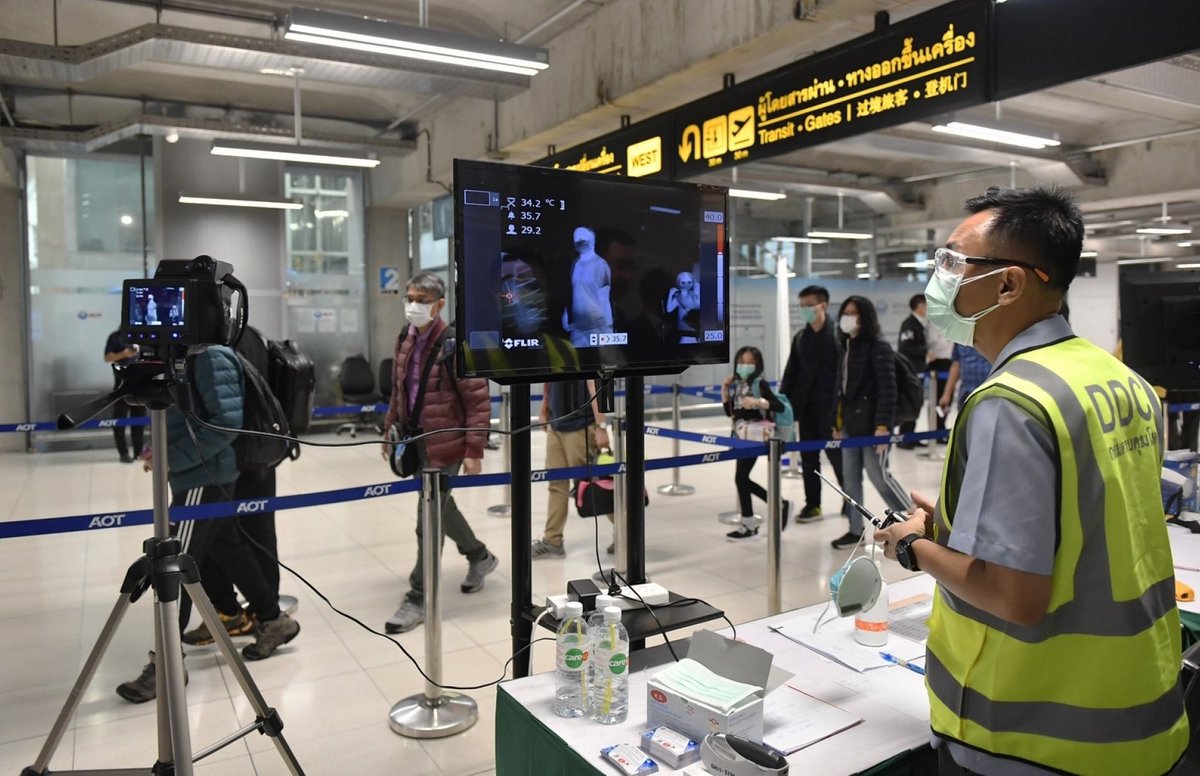
The current health crisis is a good indicator of the balance of power between the states and the digital oligopolies: in the United Kingdom, Google and Apple want to impose their standard and are trying to sabotage the authorities' application project.
theguardian.com/technology/202…
theguardian.com/technology/202…

The Italian government has just given the green light to its tracking application, "Immuni", which will be launched in the coming hours. It will work by Bluetooth and will be anonymous.
ilmessaggero.it/salute/focus/a…
ilmessaggero.it/salute/focus/a…
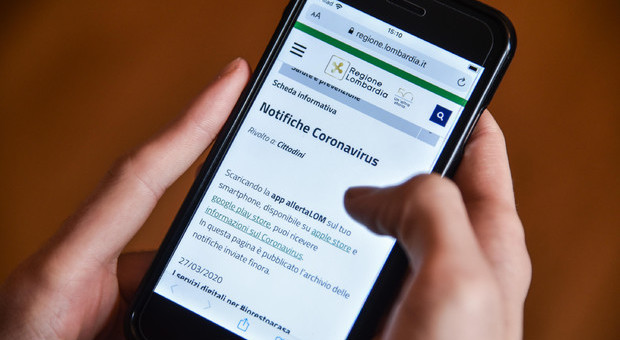
Very interesting paper from @NewYorker on the South Korean strategy to deal with the virus, which allows us to learn a few lessons from our own debates on health surveillance and deconfinement to come.
newyorker.com/news/news-desk…
newyorker.com/news/news-desk…

@NewYorker California, takes its cue from Korea with 10,000 very human contact-tracers.
https://twitter.com/techreview/status/1253082270690357249
@NewYorker As the ethicist Luciano Floridi writes, beyond the risks it poses for private life, a StopCovid-type application risks widening already existing inequalities between the connected and the neglected digital divide .
…ephilosophyofinformation.blogspot.com/2020/04/mind-a…
…ephilosophyofinformation.blogspot.com/2020/04/mind-a…

@NewYorker To be effective, a StopCovid-type app must be installed by at least 60% of the population; a study shows that the epidemic can be contained if 8 out of 10 people wear a mask.
theatlantic.com/health/archive…
theatlantic.com/health/archive…

Bluetooth is less intrusive than geolocation to track the virus. Is. But does it work? Between false positives, the thickness of the walls of your home or the position of your phone in your pocket, it is far from being acquired.
technologyreview.com/2020/04/22/100…
technologyreview.com/2020/04/22/100…

Belgium is renouncing a tracking application: "[Searching for contacts] can be done manually and it has been around for years", according to the Minister for Digital.
https://twitter.com/danielverlaan/status/1253302680719687681
"Its effectiveness depends on certain technical conditions," reports the @CNIL. Like the cooperation of Apple and Google, which still favor the DP-3T protocol.
techcrunch.com/2020/04/24/app…
techcrunch.com/2020/04/24/app…

Let's note about this topic that Germany, unlike us, has just pivoted towards a decentralized protocol, compatible with Apple and Google.
reuters.com/article/us-hea…
reuters.com/article/us-hea…

PwC and other large private groups are starting to create their own tracing applications, which are likely to be mandatory for their employees.
ft.com/content/caeb25…
ft.com/content/caeb25…

The app and the tests conducted at Ferrari involve employees, their families and suppliers (but nothing on the mandatory side or not) .
reuters.com/article/amp/id…

reuters.com/article/amp/id…


A surveillance industrialist: "We are doing more good than harm and [the health crisis] is an opportunity to show it to the world". Around the globe, opaque pharmacies close to the intelligence services are already trying to take advantage of them. 🤑
reuters.com/article/us-hea…
reuters.com/article/us-hea…

The kind of ads that appear on Instagram: a green bracelet for immune (or supposed to be), a red bracelet for those who have not yet had the #COVID19 . 

In USs, Clearview AI, the facial recognition cowboy, is approaching the authorities to participate in the tracking of contact cases of coronavirus.
https://twitter.com/NBCNewsNow/status/1254924882934185984
Europe Council on tracking apps: "Given the lack of evidence about their effectiveness, are the promises worth the social and legal risks?"
rm.coe.int/covid19-joint-…
rm.coe.int/covid19-joint-…

Masks and facial recognition: in Cannes, a start-up (Datakalab) wants to check thanks to cameras that the inhabitants wear one in the streets of the city; in Israel, a company (Corsight AI) claims to be able to recognize who is hiding beneath it.
reuters.com/article/us-hea…
reuters.com/article/us-hea…

The UK found who to entrust the security of its tracking application, centralized like StopCovid: to GCHQ, its electronic intelligence service, routine partner of the NSA.
hsj.co.uk/technology-and…
hsj.co.uk/technology-and…

• • •
Missing some Tweet in this thread? You can try to
force a refresh


